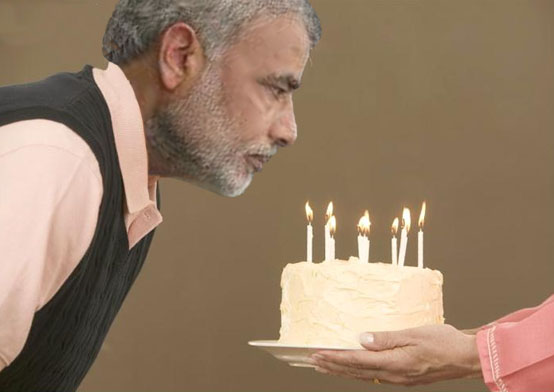Prime Minister Narendra Modi‘s 67th birthday will be celebrated at all primary schools –compulsarily- across Uttar Pradesh on September 17. Schools have been ordered to stay open on the day, which is a Sunday. It has also been made mandatory for all students to attend the celebrations. The announcement was made today : minister of state for basic education (independent charge) Anupma Jaiswal said that about 1.60 lakh government primary schools across the state will celebrate the PM’s birthday. “MLAs who have adopted schools in their region will go there and promote PM Modi’s message of cleanliness as a part of the celebrations,” she added.

Jaiswal said that Modi’s dream of a ‘Swachh Bharat’ could only be achieved by helping create awareness about cleanliness among children. “This will be the best gift to the PM on his birthday. Sweets will also be distributed among the students. The motive behind MLAs adopting schools in their areas is to ensure community participation in an effective monitoring system,” she said.
BJP state spokesperson Chandramohan said Modi was an inspiration for all. “He is a perfect icon for children because he has led a life full of hardship and today he is the most powerful man in the world’s largest democracy,” he said, adding that the birthday celebrations at schools would be a significant effort at promoting cleanliness and awareness about it among children.
Recently, the Union ministry of human resource development sent a directive to all higher education institutions to observe ‘cleanliness fortnight’ from September 1 to 15. Vice chancellors have been asked to undertake related activities in their universities and also ensure the participation of affiliated colleges. The state education department has also directed schools to observe the fortnight.
According to the UGC’s day-wise action plan, students have to observe ‘clean campus day’ on day one, ‘clean hostel day’ on day two and ‘green campus day’ and ‘clean mess day’ on the next two days. The students will have to visit slums and nearby villages to explain the concept of cleanliness, said officials.The government has also announced a nationwide essay competition on ‘What I can do for a clean India’, as well as a short film competition. The last date for entries to these competitions is September 8. The winning entries from the institute-level essay competition and members of the film clubs may be asked to participate in the competitions proposed by the ministry of drinking water and sanitation.
What are Modi’s views on Cleaniless, Sanitation and Manual Scavenging ?
Senior journalist Rajiv Shah first broke the story in November 2007. A just published book by then Gujarat chief minister, Narendra Modi, “Karmayog”, created a storm. They contained some lectures by Modi to bureaucrats at the annual bureaucratic conclave called the Chintan Shibir(s) What Rajiv Shah of the Times of India found worth reporting was contained on pages 48 and 49 of the book. Modi qualifies the Valmikis’ centuries-old caste-based vocation – of cleaning up others’ filth, including toilets – as an “experience in spirituality”! Modi says in the book, “I do not believe that they have been doing this job just to sustain their livelihood. Had this been so, they would not have continued with this type of job generation after generation.” He adds, “At some point of time, somebody must have got the enlightenment that it is their (Valmikis’) duty to work for the happiness of the entire society and the Gods; that they have to do this job bestowed upon them by Gods; and that this job of cleaning up should continue as an internal spiritual activity for centuries. This should have continued generation after generation. It is impossible to believe that their ancestors did not have the choice of adopting any other work or business.”
In another blog that the senior journalist wrote five years later, on December 1, 2012 he recounted his experience of telling this tale.
Five thousand copies of the books had been printed in 2007, but it wasn’t distributed because of the electoral code of conduct. A top public sector undertaking, according to the report by Shah, the Gujarat State Petroleum Corporation, was roped in to fund the book. When its translation was published in Tamil Nadu, Dalits groups had burnt effigies of the then chief minister expressing their outrage at his views. The issue had also been raised by member of parliament (MP) from Gujarat, Pravin Rashtrapal in the Rajya Sabha.
